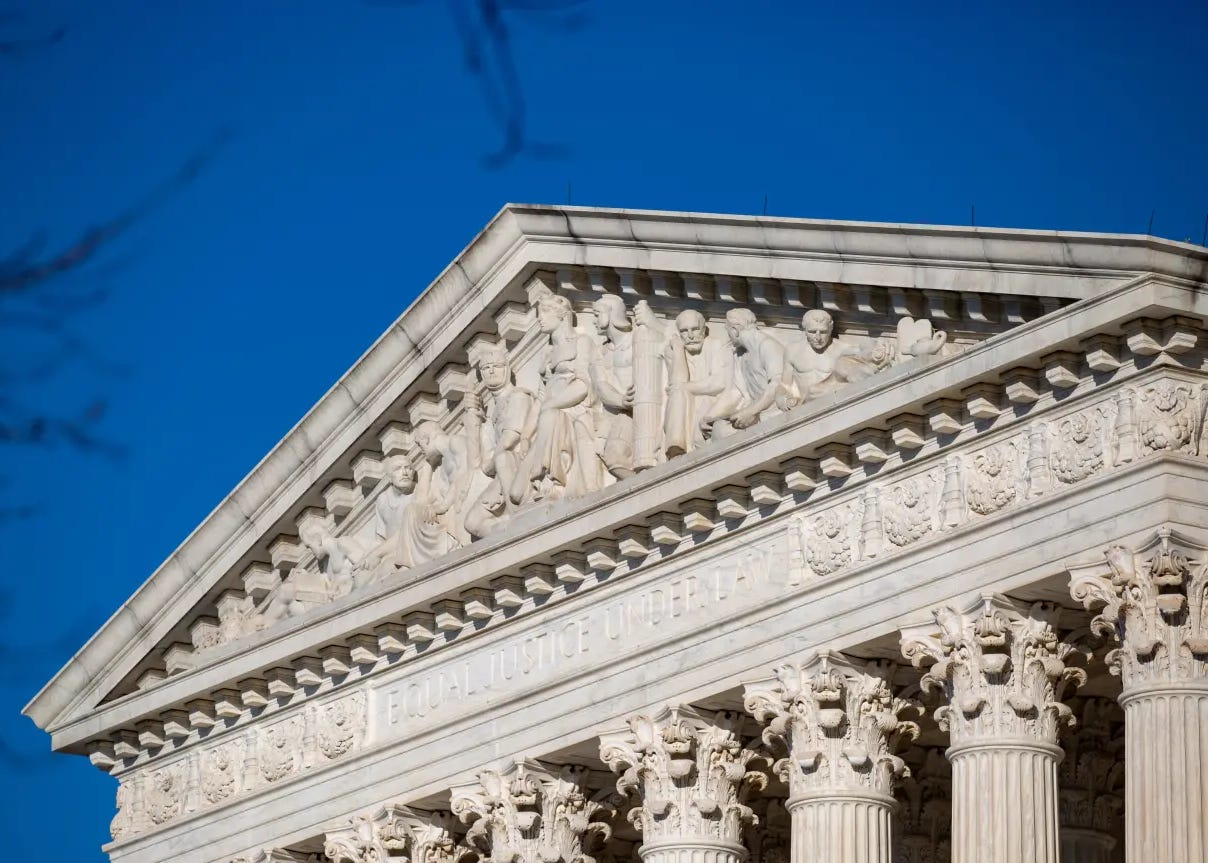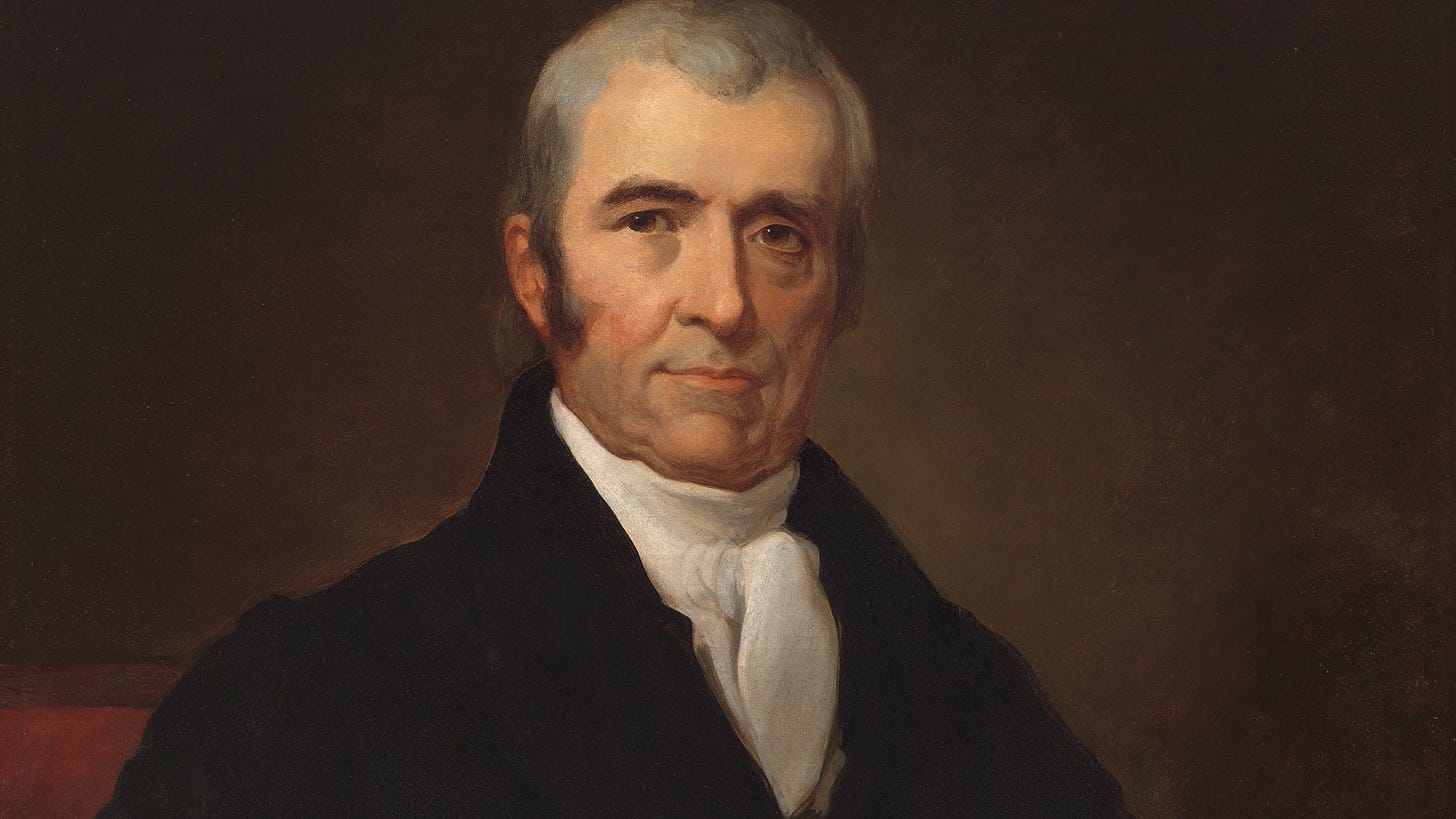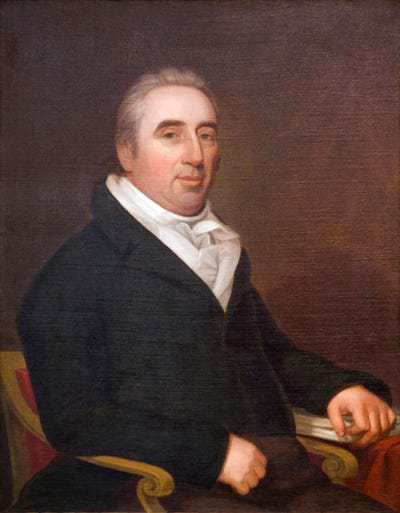February 14 - Supreme Verdict: The Ruling That Made the Supreme Court Powerful
Testing All Things Against God's Word
This is the day Chief Justice John Marshall established the principle of judicial review in 1803 by declaring that any act of U.S. Congress conflicting with the Constitution is void.
In today's lesson, we will explore how Chief Justice John Marshall's landmark ruling on constitutional authority parallels our need to ground our faith in Scripture. What gives God's Word its supreme authority in our lives? How can we better align our beliefs and actions with biblical truth in a world of competing voices?
"All Scripture is God-breathed and is useful for teaching, rebuking, correcting and training in righteousness." - 2 Timothy 3:16 (NIV)
This Date in History
The Supreme Court chambers fell silent as Chief Justice John Marshall prepared to deliver one of the most consequential decisions in American judicial history. The case before him, Marbury v. Madison, began as a relatively minor political dispute but would transform the very foundation of American government.
The case arose from the chaotic transition between Presidents John Adams and Thomas Jefferson in 1801. In his final days in office, Adams had appointed numerous "midnight judges," including William Marbury as Justice of the Peace for the District of Columbia. When Jefferson took office, he ordered his Secretary of State, James Madison, to withhold Marbury's commission. Marbury sued, demanding the Supreme Court compel Madison to deliver his commission.
At the time, the Supreme Court's role in the constitutional system remained unclear. The Constitution established the Court but didn't explicitly define its powers in relation to the other branches. No clear mechanism existed for resolving conflicts between congressional laws and the Constitution. This ambiguity left fundamental questions about who would serve as the ultimate interpreter of constitutional meaning.
Chief Justice Marshall, a committed Federalist appointed by Adams, recognized both the opportunity and danger in the case. The Supreme Court was politically vulnerable, lacking enforcement power and dependent on public acceptance of its authority. If Marshall ordered Madison to deliver the commission and Jefferson refused to comply, it would expose the Court's weakness. If he backed down, the Court might appear subservient to the executive branch.
Instead, Marshall devised an innovative solution drawing on legal principles from British common law and his own understanding of constitutional government. He structured his opinion in three parts, first establishing that Marbury had a legal right to his commission, then confirming that the law should provide a remedy, and finally examining whether the Supreme Court had proper jurisdiction to provide that remedy.
In his historic ruling, Marshall concluded that Section 13 of the Judiciary Act of 1789, which authorized the Court to issue writs of mandamus (court orders compelling government officials to fulfill their legal duties), unconstitutionally expanded the Court's original jurisdiction beyond what Article III allowed. Therefore, despite Marbury's valid claim, the Court lacked jurisdiction to help him. By declaring this section of the Act void, Marshall established the principle of judicial review, asserting that courts could strike down laws conflicting with the Constitution.
The decision's strategic brilliance lay in its political craftsmanship. By ruling against his own party's interests, Marshall appeared impartial while claiming a far more significant power for the judiciary. Jefferson got the immediate outcome he wanted but at the cost of accepting a broader principle of judicial authority. The ruling positioned the Supreme Court as the ultimate arbiter of constitutional interpretation without directly challenging executive power.
Contemporary reactions were mixed. Some praised the logical force of Marshall's argument, while others questioned whether the Constitution truly granted courts this power of review. Jefferson himself later argued that allowing the judiciary to definitively interpret the Constitution's meaning gave them dangerous supremacy over the other branches. This debate continues today, with scholars and legal experts still arguing about the proper scope of judicial review and whether Marshall's interpretation went beyond the Founders' intent.
Despite ongoing controversy, Marshall's doctrine of judicial review became a cornerstone of American constitutional law. The power to invalidate unconstitutional laws transformed the Supreme Court from what Alexander Hamilton called the "least dangerous branch" into a coequal, or greater, part of the federal government. This authority has shaped American democracy through landmark decisions on civil rights, presidential power, and individual liberties.
Historical Context
The political atmosphere of 1803 reflected deep tensions between Federalists and Democratic-Republicans over the nature of federal power. The young nation struggled with fundamental questions about the relationship between its branches of government. The Constitution's framers had created a system of checks and balances but left considerable ambiguity about how these would function in practice.
The judiciary particularly suffered from uncertainty about its role and powers. Many viewed courts as simply arbiters of individual disputes rather than interpreters of constitutional meaning. The Supreme Court had not yet established itself as a truly independent institution. It operated in borrowed quarters, had decided few significant cases, and possessed neither dedicated funding nor enforcement mechanisms. In this environment, Marshall's assertion of judicial review represented a bold claim of constitutional authority that would fundamentally reshape American governance.
Did You Know?
Before becoming Chief Justice, John Marshall served as Secretary of State under President John Adams from 1800 to 1801. This gave him intimate knowledge of the commission delivery process at the heart of the Marbury case.
The Supreme Court met in six different locations before getting its own building in 1935. When Marshall delivered the Marbury decision, the Court operated from a small committee room in the Capitol building.
William Marbury never received his commission as Justice of the Peace, but he went on to have a successful career as president of the Bank of Columbia and served on the board of directors for several other banks.
The principle of judicial review existed in some state courts before Marbury v. Madison, but Marshall's ruling established it as a fundamental power of the federal judiciary.
Today’s Reflection
Chief Justice Marshall's historic ruling to uphold the authority of the Constitution demonstrates the importance of an unchanging foundation for governance. His decision affirmed that the Constitution, not public pressure or fleeting opinions, serves as the ultimate measure of lawful authority. This mirrors the believer's responsibility to test every teaching and conviction against Scripture, which stands as our spiritual constitution. Without this firm grounding, both nations and individuals risk being swayed by ever-shifting trends and ideologies.
Scripture declares, "All Scripture is God-breathed and is useful for teaching, rebuking, correcting and training in righteousness" 2 Timothy 3:16 (NIV).
Like the Constitution for a nation, the Bible equips believers with a reliable standard for truth and a safeguard against error. In a world filled with competing voices, this truth becomes vital. By immersing ourselves in God's Word, we can discern what is true and align our lives with His eternal principles.
Marshall's methodology also offers a powerful lesson. He refused to rely on popular opinion or political pressures, choosing instead to consult the foundational document directly. As Christians, we are called to the same discipline in our faith.
"Do not merely listen to the word, and so deceive yourselves. Do what it says" James 1:22 (NIV)
This verse reminds us that personal engagement with Scripture is essential. Relying solely on others' interpretations, no matter how trustworthy, leaves us vulnerable to confusion and error.
Cultural pressures often present ideas that sound good but conflict with God's truth. The Bible urges us to carefully evaluate these influences, saying, "Test everything. Hold on to what is good" 1 Thessalonians 5:21 (NIV). This discernment requires a deliberate, prayerful approach to Scripture, where we evaluate every teaching, trend, and belief against the eternal Word of God. Without this vigilance, we risk compromising our faith.
Spiritual growth comes from more than casual Bible reading. It requires consistent study and reflection, allowing God's Word to shape our hearts and minds. The Bible reminds us, "For the word of God is alive and active. Sharper than any double-edged sword" Hebrews 4:12 (NIV). As we meditate on Scripture, it reveals and refines our thoughts, enabling us to stand firm in a world of shifting values.
The strength of a democracy depends on its citizens' commitment to constitutional principles, just as the vitality of our faith rests on our devotion to biblical truth. By anchoring ourselves in God's Word, we find stability in an unstable world. Scripture is not merely a set of rules; it is the revelation of God's love and guidance. Rooted in His unchanging truth, we can navigate life's uncertainties with confidence, knowing we are firmly aligned with His will.
Practical Application
Set aside time this week to identify three cultural messages or popular teachings that influence your thinking. Write them down, then search Scripture to evaluate each one. Look for specific verses that either support or challenge these ideas. Keep a journal of what you discover, noting how God's Word provides clarity and direction. This exercise will strengthen your ability to use Scripture as your standard for truth and decision-making.
Closing Prayer
Heavenly Father, we thank You for the gift of Your Word, our perfect and unchanging foundation for life. As Chief Justice Marshall upheld the Constitution's supreme authority, help us honor Your Scripture as our ultimate guide. Give us discernment to test everything against Your truth and courage to stand firm when cultural voices conflict with biblical principles. Strengthen our commitment to regular Bible study, that we might grow in wisdom and understanding. May Your Holy Spirit illuminate Your Word as we read, showing us how to apply its timeless truths to our daily decisions. Grant us the conviction to rely on Scripture's authority rather than shifting human opinions. In Jesus' name, Amen.
Final Thoughts
Marshall's historic defense of constitutional authority provides a powerful parallel for Christians today. Just as he established the Constitution as the supreme measure for American law, we must maintain Scripture as our highest authority for faith and life. This commitment requires more than casual acceptance. It demands careful study, thoughtful application, and unwavering dedication to God's truth, even when popular opinion pulls in other directions. When we ground ourselves firmly in God's Word, we find wisdom to navigate life's challenges and strength to stand for truth in an ever-changing world.
THIS IS THE DAY Last Year
Author’s Notes
Happy Valentine’s Day if you are inclined to celebrate such a holiday. If not, Happy Friday!
Whether you go all out with flowers, chocolates, and romantic gestures or prefer to keep things simple, let us all remember that love shouldn’t be confined to just one day a year. Valentine’s Day can be a beautiful opportunity to express affection, but it’s even more meaningful when it reflects a love that is consistent every day.
True love is built in the everyday moments. It’s in encouraging words, acts of kindness, patience, forgiveness, and intentional time spent together. These are the little things that often go unnoticed but mean the most. While it’s lovely to celebrate today if you choose, don’t let it be the only time you tell someone how much they mean to you or go out of your way to show it. Let today remind us to cultivate a lifestyle of love, gratitude, and thoughtfulness all year long. It’s not about grand gestures as much as it is about creating a foundation of love that lasts far beyond a single holiday.
On that note, I have to say, my wife is the best valentine anyone could have. She is my greatest blessing, my constant support, and the one who makes every day better just by being near me. I may never know why she chose me, but I am so grateful for her unyielding and unending love, and all of the many things she does for me and our family. She means the world to me, and I couldn’t be more thankful to share life with her. I am truly blessed beyond measure.
This devotional is free to read. You can support this publication by becoming a subscriber, upgrading to paid subscriber status, liking (❤️) this post, commenting, and/or sharing this post with anyone who might enjoy it. You can also make a ONE-TIME DONATION in any amount. Thank you for your support!













Thank you Jason - this was a deep dive that I needed. Have a blessed day.
Sadly, one of the main issues with today's modern church is that is allows culture to define what it does and who it is. I saw this happen clearly in 2020 at the church I had been a part of for 8 years, and I ended up needing to go elsewhere. But more deeply, the lack of attention to scriptural truth is where far too many churches allow cultural peer pressure to define it.